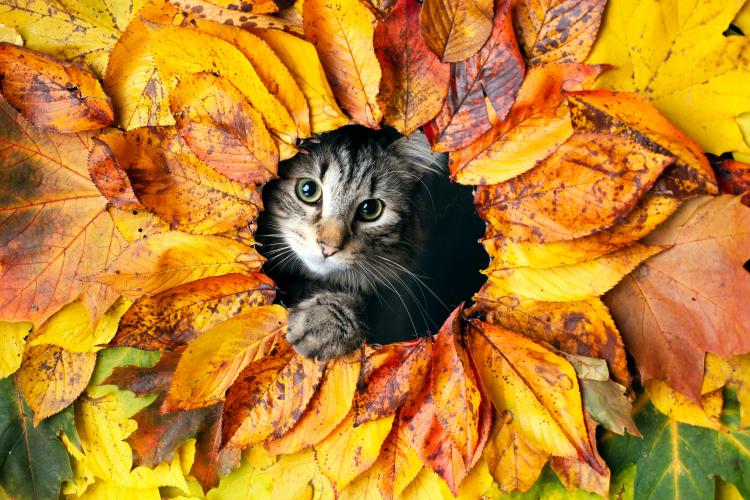Ready to help treat your pet to a healthy life?
Thanksgiving Dangers for Pets: Keep Your Pets Safe This Holiday
By : Brooklyn Benjestorf | Published Nov 19, 2025

From turkey and stuffing to pumpkin pie and butter tarts, Thanksgiving is all about family, football, and fall flavors. But while we’re celebrating, our pets may be plotting their own feast, and not everything on the table is safe for them. “With lots of festivities and food to look forward to with Thanksgiving, don't forget to plan for holiday mischief with your pets,” says veterinarian, Deanna Glasgow, DVM FFCP, Black Creek Animal Hospital. “Some planning before the big day arrives helps to keep your pets safe.” To help you prepare, Trupanion looked at the accidents and illnesses most often linked to Thanksgiving celebrations — and how to keep furry family members safe from these holiday-related hazards.
Thanksgiving pet dangers
Incidents linked to Thanksgiving weekend: Top pet accidents & illnesses (2020-2024*)
Condition | Average invoice (CAD) | Max invoice (CAD) |
|---|---|---|
Vomiting | $806 | $13,626 |
Diarrhea | $468 | $5,548 |
Foreign Body Ingestion | $1,512 | $8,703 |
Gastroenteritis | $677 | $3,876 |
Poisoning or toxin exposure | $620 | $3,972 |
*According to Trupanion Canadian accident/illness claims occurring only during the 3-day weekends of Candian thanksgiving 2020-2024.
Here’s what to look out for
Turkey & rich foods
That perfectly roasted turkey is hard for anyone to resist, including your pets, but many Thanksgiving foods can cause digestive upset. Even a few bites of rich food can lead to vomiting, diarrhea, or abdominal pain.
“Potentially dangerous foods could include bones, high fat items like turkey skin, dishes containing onions, grapes, and more,” says Dr. Glasgow. These foods also often contain ingredients from the Allium family (such as onions, garlic, leeks, chives, and shallots) which are highly toxic to pets, whether they're fresh, cooked into stuffing or gravy, or used in powdered form. Trupanion data shows claims related to gastrointestinal upset, like vomiting and diarrhea, were among the most claimed conditions during the Thanksgiving holiday.
Turkey day tip: As tempting as it might be to share, it’s safest to keep Thanksgiving foods away from pets entirely. Remind your guests, especially the kids, that even a tiny taste can upset your pet’s stomach or even cause more serious harm. Setting clear boundaries before the feast starts means everyone gets to enjoy dinner without any accidental treats finding their way under the table.
Bones & leftovers
That pile of leftovers on the counter might look like a buffet to your pet, but cooked turkey or ham bones are anything but a treat. Once cooked, these bones become brittle and can splinter, leading to choking, blockages, or even tears in the digestive tract. Leftovers wrapped in foil or string are just as tempting and can land your pet in the emergency room, as even items like skewers or corn cobs can cause dangerous choking hazards or obstructions if swallowed. Foreign body ingestion can be an expensive emergency; Trupanion’s highest related claim in 2025 totaled $45,708. Since 2020, hundreds of claims related to foreign body ingestion have been reported over Thanksgiving weekend.
Turkey day tip: Dispose of your animal bones and other trash quickly in a tightly secured garbage bin to keep those curious noses at bay, and make sure it’s stored somewhere they can’t easily access it.
Chocolate & desserts
Poisoning and toxicity rank among the top claims for Canadian pets over Thanksgiving weekend, often linked to chocolate, xylitol (sometimes called “birch sugar” and found in sugar-free treats), or grape and raisin ingestion. Even small amounts of these ingredients can cause serious health issues for pets.
In a recent episode of Radio Trupanion, veterinary neurologist Dr. Carrie Jurney noted: “Whoever did the marketing that chocolate is toxic to dogs, we need to get them to get on things like grapes and xylitol because I don't think a lot of people know how toxic those things are for dogs.”
Turkey day tip: Pumpkin pie and butter tarts, Canadian holiday staples, often contain nutmeg, raisins, or other spices that can be harmful. To be safe, keep the dessert table out of reach and don’t leave any plates or flatware unattended.
What to do in an emergency
If your pet gets into something they shouldn’t:
- Call your veterinarian or the nearest emergency hospital immediately.
- Watch for symptoms like vomiting, diarrhea, restlessness, or bloating.
- If any symptoms are observed, act fast. Some toxins (like chocolate, raisins, or xylitol) can become life-threatening within hours.
Prevention tips
- Keep food and leftovers away from counters and tables.
- Secure garbage bins with tight lids.
- Provide pet-safe treats (like carrots, apple slices without seeds, or store-bought pet snacks).
- Offer a quiet, cozy space if the house gets busy.
- Remind guests (especially the kids!) not to feed pets from their plates.
Thanksgiving is about gratitude, family, and togetherness — and that includes our pets. With a little extra care, you can help keep your furry companions safe while still enjoying all the holiday traditions.
However, even with the best preparation, accidents can still occur. The best emergency plan includes a comprehensive pet insurance policy that can give you peace of mind that your pet can get the care they need without delay.
